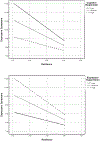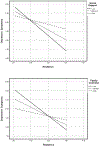Depressive Symptoms and Resilience among Hispanic Emerging Adults: Examining the Moderating Effects of Mindfulness, Distress Tolerance, Emotion Regulation, Family Cohesion, and Social Support
- PMID: 31935162
- PMCID: PMC7358125
- DOI: 10.1080/08964289.2020.1712646
Depressive Symptoms and Resilience among Hispanic Emerging Adults: Examining the Moderating Effects of Mindfulness, Distress Tolerance, Emotion Regulation, Family Cohesion, and Social Support
Abstract
Emerging adulthood has been described as a difficult stage in life and may be particularly stressful for Hispanic emerging adults who are disproportionately exposed to adversity and chronic sociocultural stressors. To better prevent and treat depressive disorders among Hispanic emerging adults, more research is needed to identify and understand modifiable determinants that can help this population enhance their capacity to offset and recover from adversity and sociocultural stressors. As such, this study aimed to (1) examine the association between resilience and depressive symptoms among Hispanic emerging adults, and (2) examine the extent to which intrapersonal resources (e.g., mindfulness, distress tolerance, emotion regulation strategies) and interpersonal resources (e.g., family cohesion, social support) moderate the association between resilience and depressive symptoms. To examine these aims, 200 Hispanic emerging adults (ages 18-25) from Arizona (n = 99) and Florida (n = 101) completed a cross-sectional survey, and data were analyzed using hierarchical multiple regression and moderation analyses. Findings from the hierarchical multiple regression indicate that higher resilience was associated with lower depressive symptoms. Findings from the moderation analyses indicate that family cohesion, social support, and emotion regulation strategies (e.g., cognitive reappraisal and expressive suppression) functioned as moderators; however, mindfulness and distress tolerance were not significant moderators. Findings from this study add to the limited literature on resilience among Hispanics that have used validated measures of resilience. Furthermore, we advance our understanding of who may benefit most from higher resilience based on levels of intrapersonal and interpersonal resources.
Keywords: Cognitive reappraisal; interpersonal resources; intrapersonal resources; positive adaptation; reserve capacity.
Conflict of interest statement
Author Disclosures: All authors declare that they have no conflicts of interest and do not have any financial disclosures to report.
Figures


Similar articles
-
Life Stressors, Resilience Resources, and Asthma Among Adults in the Hispanic Community Health Study/Study of Latinos.J Allergy Clin Immunol Pract. 2025 Jun;13(6):1375-1384.e7. doi: 10.1016/j.jaip.2025.02.031. Epub 2025 Mar 7. J Allergy Clin Immunol Pract. 2025. PMID: 40057187
-
Cultural Mistrust, Ethnic Discrimination, and Depressive Symptoms among Hispanic Emerging Adults.J Health Care Poor Underserved. 2022;33(2):612-622. doi: 10.1353/hpu.2022.0051. J Health Care Poor Underserved. 2022. PMID: 35574864
-
Perceived Stress and Depressive Symptoms Among Recent Latino/a Immigrants: The Moderating Effects of Emotion Regulation and Dispositional Mindfulness.J Health Care Poor Underserved. 2023;34(3):884-909. J Health Care Poor Underserved. 2023. PMID: 38015128
-
A meta-analysis of cognitive reappraisal and personal resilience.Clin Psychol Rev. 2024 Jun;110:102428. doi: 10.1016/j.cpr.2024.102428. Epub 2024 Apr 7. Clin Psychol Rev. 2024. PMID: 38657292 Review.
-
Linking Cognitive Reappraisal and Expressive Suppression to Mindfulness: A Three-Level Meta-Analysis.Int J Environ Res Public Health. 2023 Jan 10;20(2):1241. doi: 10.3390/ijerph20021241. Int J Environ Res Public Health. 2023. PMID: 36673984 Free PMC article. Review.
Cited by
-
Exposure to ethnic discrimination in social media and symptoms of anxiety and depression among Hispanic emerging adults: Examining the moderating role of gender.J Clin Psychol. 2021 Mar;77(3):571-586. doi: 10.1002/jclp.23050. Epub 2020 Sep 1. J Clin Psychol. 2021. PMID: 32869867 Free PMC article.
-
Depressive symptoms among recent Latinx immigrants in South Florida: The role of premigration trauma and stress, postimmigration stress, and gender.J Trauma Stress. 2022 Apr;35(2):533-545. doi: 10.1002/jts.22768. Epub 2021 Dec 31. J Trauma Stress. 2022. PMID: 34973038 Free PMC article.
-
The role of sociocultural factors on alcohol self-efficacy and protective drinking behaviors among Hispanic/Latinx young adults.Ethn Health. 2024 May-Jul;29(4-5):553-577. doi: 10.1080/13557858.2024.2345916. Epub 2024 May 7. Ethn Health. 2024. PMID: 38714915 Free PMC article.
-
Mediating Effects of Psychological Independence and Social Support on the Association Between Family Strength and Depression in Young Korean Adults: Cross-Sectional Study.JMIR Form Res. 2025 Jun 27;9:e71485. doi: 10.2196/71485. JMIR Form Res. 2025. PMID: 40576976 Free PMC article.
-
Association between cognitive insight and anxiety among community-dwelling schizophrenia patients: the chain mediating effects of family cohesion and chronotype.Front Psychiatry. 2024 Aug 19;15:1371431. doi: 10.3389/fpsyt.2024.1371431. eCollection 2024. Front Psychiatry. 2024. PMID: 39267698 Free PMC article.
References
-
- Substance Abuse and Mental Health Services Administration. Key substance use and mental health indicators in the United States: Results from the 2017 National Survey on Drug Use and Health. www.samhsa.gov/data/report/2017-nsduh-annual-national-report. Updated September 12th, 2018 Accessed on November 25th, 2019.
-
- Pratt LA. Brody DJ. Depression in the U.S. household population, 2009–2012. National Center for Health Statistics—Data Brief 172. www.cdc.gov/nchs/products/databriefs/db172.htm. Updated November 6th, 2015 Accessed November 25th, 2019.
-
- Cano MA, Castillo LG, Castro Y, de Dios MA, Roncancio AM. Acculturative stress and depressive symptomatology among Mexican and Mexican American students in the U.S.: Examining associations with cultural incongruity and intragroup marginalization. Int J Adv Couns. 2014;36(2):136–149. doi:10.1007/s10447-013-9196-6 - DOI - PMC - PubMed
Publication types
MeSH terms
Grants and funding
LinkOut - more resources
Full Text Sources
Medical
Research Materials
